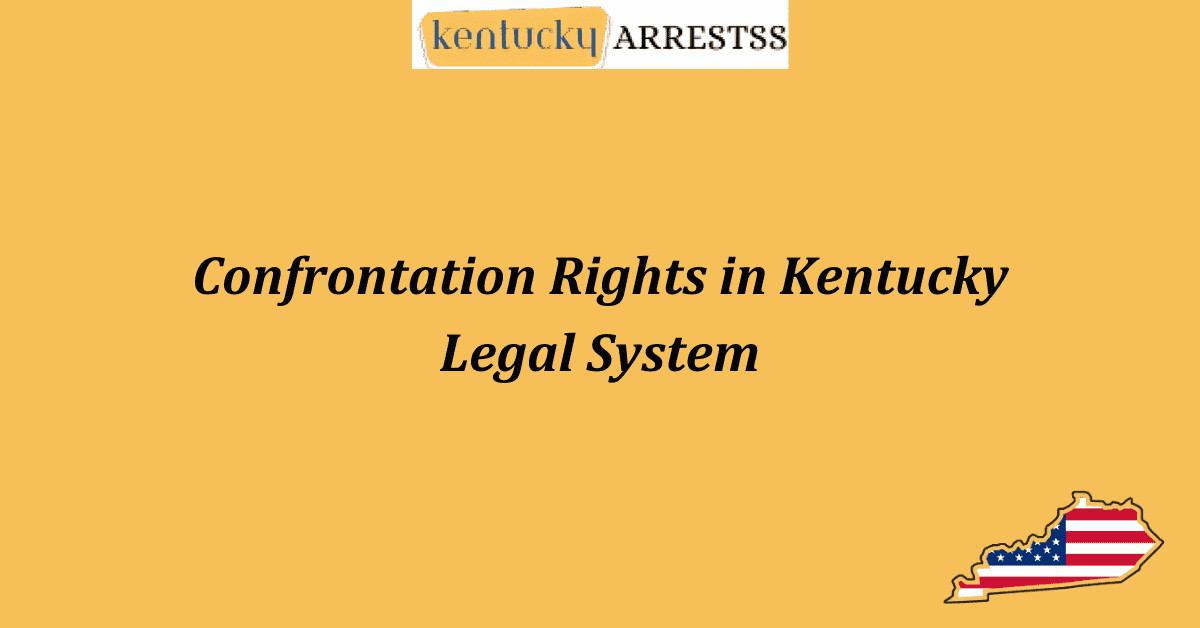Confrontation Rights in Kentucky Legal System
Confrontation rights in the Kentucky legal system play a crucial role in ensuring fair trials and upholding the principles of justice. By allowing individuals the right to confront witnesses testifying against them, this fundamental right safeguards against false accusations and unreliable testimony. In Kentucky, the legal framework surrounding confrontation rights is designed to protect the accused and maintain the integrity of the judicial process.
Individuals facing legal proceedings in Kentucky should be aware of their confrontation rights and how they can exercise them during a trial. Understanding the nuances of confrontation rights can make a significant difference in the outcome of a case and the overall fairness of the legal proceedings. Whether it involves cross-examining witnesses or challenging evidence presented in court, knowing how to assert confrontation rights is essential for anyone navigating the Kentucky legal system.
Kentucky’s Crucial Confrontation Rights
The confrontation rights, also known as the right of facing accusers, play a crucial role in ensuring fair trials for accused individuals in Kentucky. This fundamental right, guaranteed by the Sixth Amendment of the U.S. Constitution and further reinforced by the confrontation clause, grants defendants the opportunity to confront and cross-examine witnesses against them. By allowing the accused to challenge the credibility and reliability of witnesses, the confrontation rights help prevent wrongful convictions and protect the integrity of the legal system.
Challenging Witness Credibility and Reliability
One of the key aspects of confrontation rights is the ability to challenge witness credibility and reliability. By cross-examining witnesses, defense attorneys can uncover inconsistencies, biases, or motives that may affect the reliability of their testimony. This process is essential in revealing the truth and ensuring that only credible evidence is considered in court proceedings.
Addressing Testimony Inconsistencies and Inaccuracies
Confrontation rights also enable accused individuals to address testimony inconsistencies and inaccuracies effectively. By questioning witnesses about contradictory statements or unreliable information, defendants can cast doubt on the prosecution’s case and present a more accurate picture of the events in question. This level of scrutiny is crucial in preventing miscarriages of justice and upholding the principles of a fair trial.
Enhancing Legal Transparency & Accountability
Confrontation rights are instrumental in promoting transparency and accountability in legal proceedings. By empowering individuals to challenge witness testimony and present their own evidence, these rights help ensure that legal decisions are based on reliable and verifiable information. This level of scrutiny not only protects the rights of the accused but also enhances public trust in the justice system.
Empowering Individuals to Defend Themselves Effectively
Confrontation rights empower individuals to defend themselves effectively against criminal accusations. By allowing defendants to confront their accusers and challenge witness testimony, these rights level the playing field and give accused individuals a fighting chance to present their side of the story. This empowerment is essential in ensuring that everyone receives a fair trial and is not unjustly deprived of their freedom.
Upholding Principles of Justice and Due Process
Confrontation rights play a pivotal role in upholding the principles of justice and due process in the legal system. By guaranteeing accused individuals the right to confront and cross-examine witnesses, these rights ensure that legal proceedings are conducted fairly and transparently. This commitment to due process helps safeguard individual rights and maintains the integrity of the criminal justice system.
Protecting Rights Through Confrontation: Vital Role
Confrontation rights in Kentucky are essential for safeguarding individual rights and ensuring fair legal proceedings. By allowing accused individuals to challenge witness testimony, confront their accusers, and present their own evidence, these rights promote transparency, accountability, and due process in the criminal justice system. Upholding confrontation rights is crucial in protecting the rights of the accused and maintaining the integrity of the legal system.
Frequently Asked Questions
Our Frequently Asked Questions section aims to provide detailed information about Confrontation Rights in the Kentucky Legal System to enhance your understanding of this topic.
What are Confrontation Rights?
Confrontation Rights refer to the legal right of a defendant to confront and cross-examine witnesses against them in a criminal trial. This right is guaranteed by the Sixth Amendment of the United States Constitution and ensures a fair trial for the accused.
How are Confrontation Rights protected in Kentucky?
In Kentucky, Confrontation Rights are protected by both the state constitution and the U.S. Constitution. The Kentucky Rules of Evidence also establish guidelines for the admission of testimonial evidence and the right to confront witnesses.
What is the significance of Confrontation Rights in a trial?
Confrontation Rights play a crucial role in ensuring the reliability and credibility of witness testimony. By allowing the defendant to cross-examine witnesses, the court can uncover inconsistencies or falsehoods in their statements, ultimately leading to a fairer trial outcome.
Can Confrontation Rights be waived?
Confrontation Rights can be waived under certain circumstances, such as when a defendant voluntarily chooses not to cross-examine a witness or agrees to stipulate to certain facts in the case. However, any waiver of Confrontation Rights must be done knowingly and voluntarily.
What types of evidence are covered by Confrontation Rights?
Confrontation Rights typically apply to testimonial evidence, such as witness statements, depositions, and affidavits. However, the scope of Confrontation Rights may vary depending on the specific circumstances of the case and the type of evidence being presented.
How do Confrontation Rights impact the admissibility of evidence?
Confrontation Rights can affect the admissibility of evidence in a trial, particularly if the witness is unavailable to testify or if the defendant is unable to cross-examine them. In such cases, the court must carefully consider the reliability and relevance of the evidence before admitting it.






